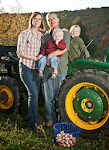 How? you might ask... Well, it's because they don't eat if they're thirsty, and if chickens don't eat, they don't put on meat. This is just as true for laying hens as broilers. Think about the water content of that egg that you crack open for baking or frying up in the skillet...there's a lot of water there. Dehydrated hens either won't lay or lay smaller eggs. Either way, I loose money.
How? you might ask... Well, it's because they don't eat if they're thirsty, and if chickens don't eat, they don't put on meat. This is just as true for laying hens as broilers. Think about the water content of that egg that you crack open for baking or frying up in the skillet...there's a lot of water there. Dehydrated hens either won't lay or lay smaller eggs. Either way, I loose money.When we scaled up last year into doing thousands of broilers, an automatic watering system was one of the top things on our list to figure out. I can't imagine life without it. I spend only a few seconds each day on watering birds, and right now I have around 3500 birds on grass or in the brooder. I'd been out of business before I even got started if I had to hand water all these birds.
The system is pretty simple. Pressurized line with feeder lines that connect to sets of pens. The pens are daisy-chained together and each pen has a Plasson bell waterer like the one to the right. I prefer the breeder waterers over the broiler models. With only a few parts, they're really reliable. When a part fails it's usually only around a buck to repair it and by extra parts for the next waterer malfunction to have on hand. Living in poultry country, only miles from the Corporate HQ of integrators like Tyson, Simmons, Peterson, and more, I can literally just run to the store and by parts for the waterers.
The labor involved in watering is one of the main reasons that poultry production moved to confinement systems in the mid 20th Century.
As I type this...I realize that I too need a drink of water too...haven't figured out a way to automize that. Guys, if you think it's getting a wife, you've got another thing coming. If anything, it's the other way...but that's a whole other topic

.JPG)
.JPG)
.JPG)

